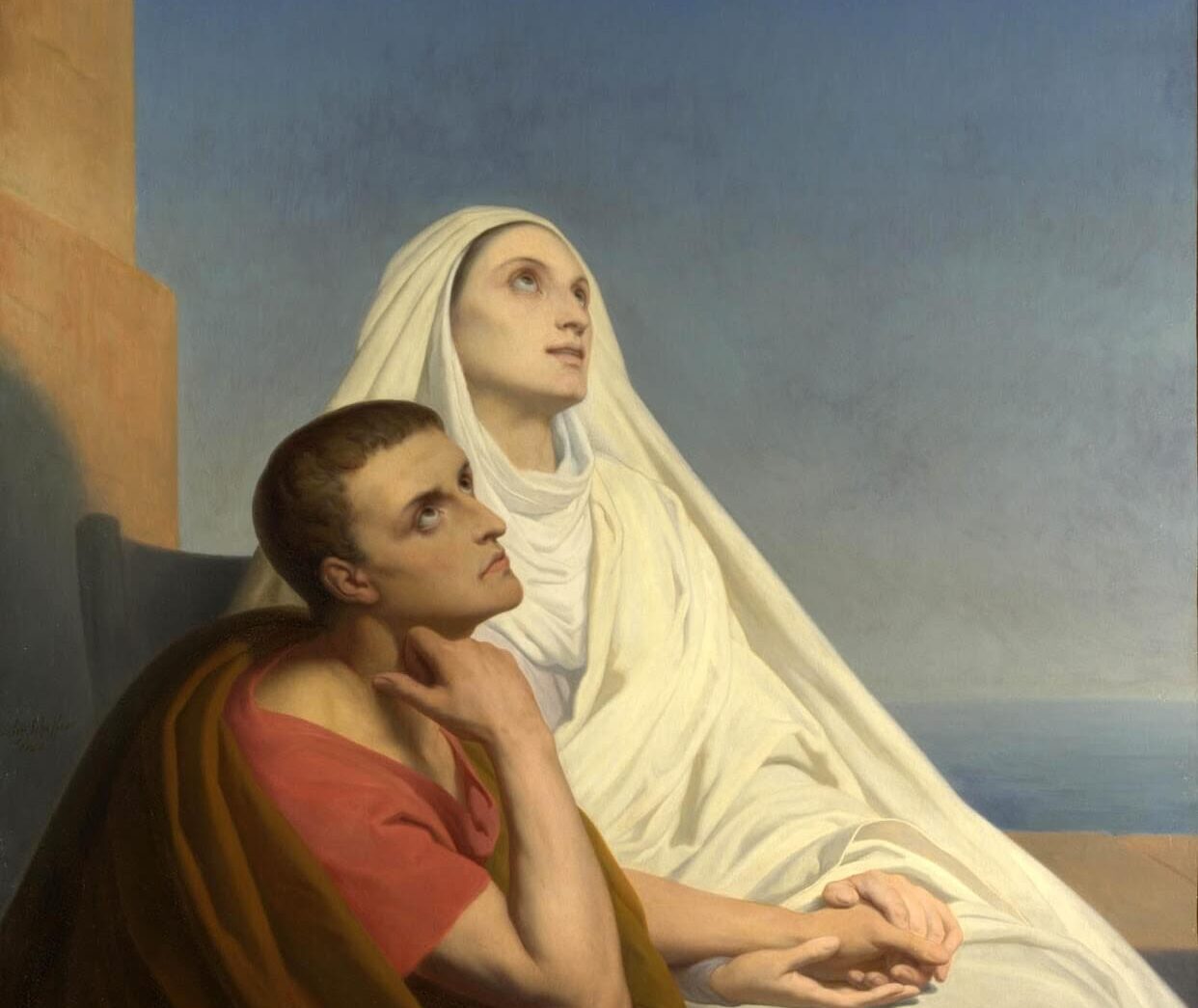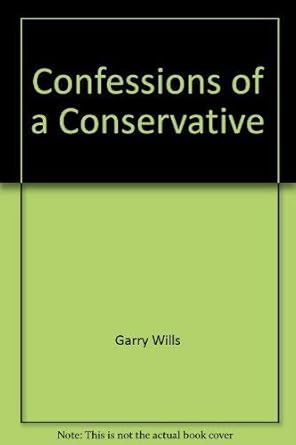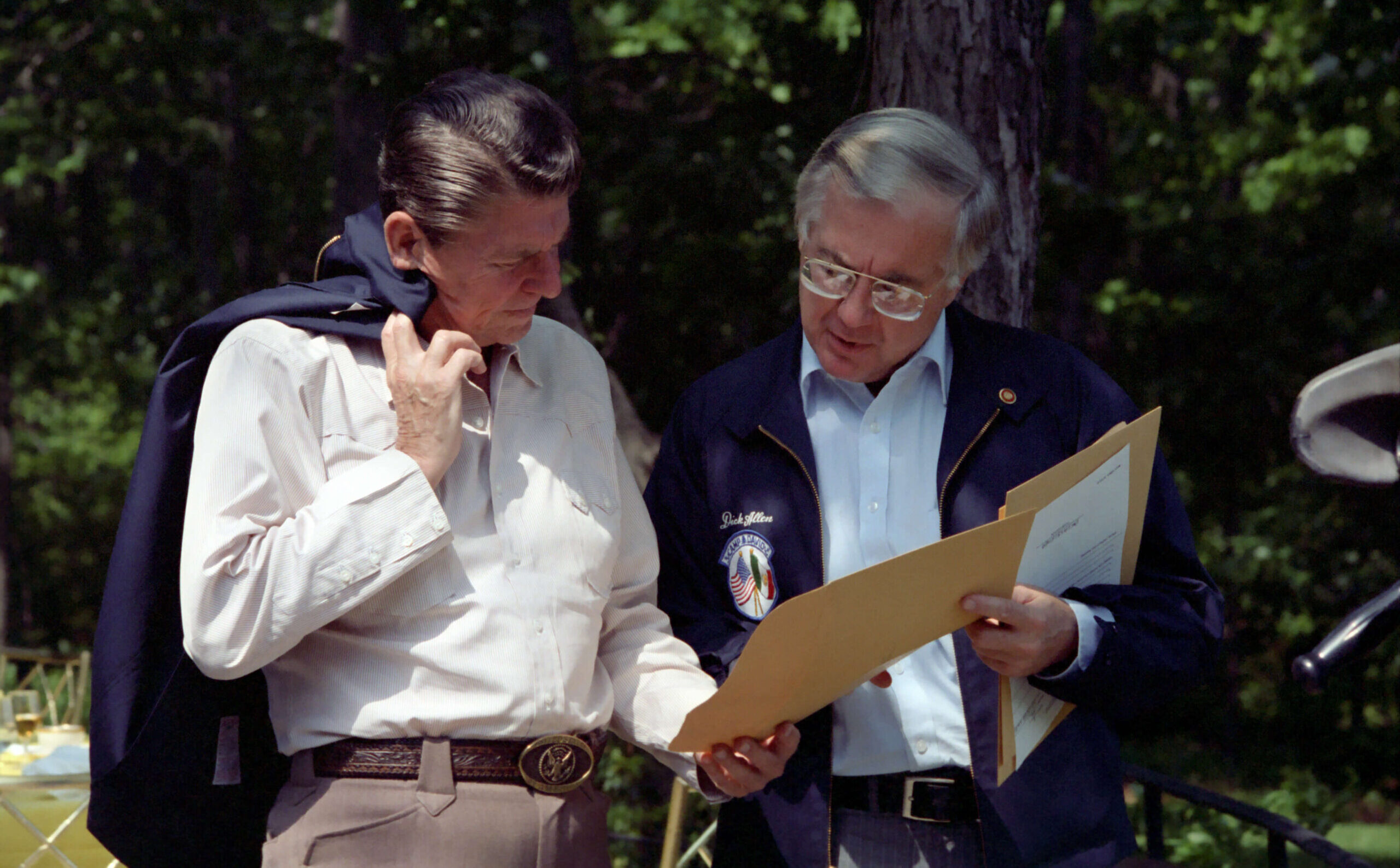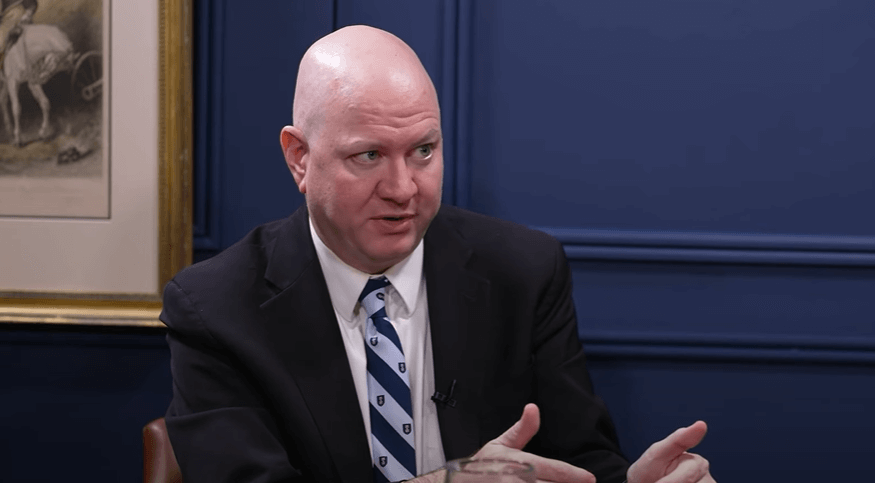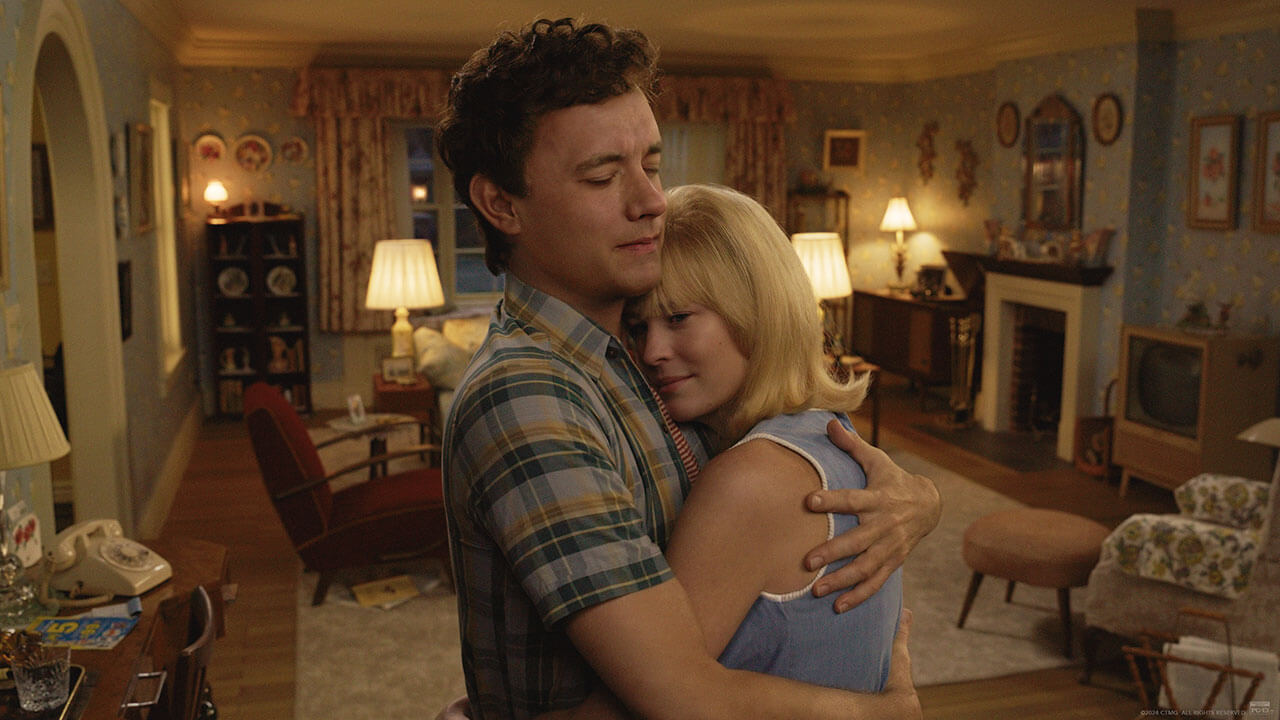No one in the history of political philosophy, or in most other fields for that matter, is more important than Augustine. Nor is anyone more sane, wise, memorable, and delightful than G. K. Chesterton, unless it be perhaps Samuel Johnson. That is why, in recent years, I have insisted that my students exercise their freedom to read The Confessions, Orthodoxy, or Boswell’s Life. Rarely do those students rash enough to follow my injunctions return as the same persons. That Garry Wills confesses such truths is, I confess, refreshing and important for a generation just learning about its accumulated emptiness from a Russell Kirk (whom Mr. Wills seems not to have liked) or even from the need for curriculum reform at Harvard.
Throughout Western, particularly Latin literature, the shadowy figure of the ex-cleric spending the rest of his days building on or, more usually, destroying the capital he accumulated during his seminary days, is a familiar one. It would indeed be interesting to compare the ex-clerics of the eighteenth century in particular with those of more recent vintage. During the past quarter-century no organization has financed the earlier (and higher) education of more varied writers, philosophers, and pundits than the Society of Jesus. And, generally speaking, it is fairly clear at what stage the particular person in question left the Order’s (at that time) long years of study—a salutary training now largely abandoned by the Order itself. Governor “Jerry” Brown, for instance, only had his two years of novitiate spiritual training and perhaps a year of classical studies, while Malachi Martin was ordained with a degree in biblical studies. Garry Wills had the novitiate, classical and philosophical, but not the theological studies.
Furthermore, a good insight into the character of an ex-clerical author can be gained from noting how he recalls his relationship to his religious experience. The Society of Jesus, in the United States at least, has been rather fortunate in having so many—could they be called?—alumni who retain a great if bemused affection and sense of debt to the Order. The fact is that without the Jesuit training, its giving time and space and incentive, few would have ever had a start on the intellectual life; few would have had the financial and spiritual resources. In a strange way, I think, religious orders are almost the only real “classless” societies in the modern world. It would be fruitful to suggest that the very concept is a secularization of religious life. Few campuses today, in any case, are without at least a token ex-Jesuit or two, where they do not actually have a “live” one. On the other hand, the fact that the Jesuit and other Catholic religious orders, particularly the Dominicans, no longer give a long and solid intellectual training to their younger members may well be the most serious crisis in the contemporary Church. It will be interesting to see how the “Philosopher-Pope’’ confronts this issue.
Several years ago Garry Wills wrote a bitting, satirical essay in New York Magazine about the “life-style,” academic and otherwise, of the Jesuit theologate called Woodstock in New York City. As the most famous of the American Jesuit theologates, its condition and eventual demise were to become something of a symbol of the chaos of the American Catholic Church. Not a few felt that the Wills essay was significant in the killing of Woodstock, or at least calling its conditions to public attention that could not be ignored. From that time on Wills took on the function of calling the Church and the orders back to themselves, as he saw it. The emphasis on the unattainability of justice in Confessions of a Conservative puts him in great critical contrast to the trend of Catholic religious and intellectual life today, which seems so naively bent on preaching the opposite that justice is almost the sole content of the religious and theological enterprise.
In the present book Wills’ confessions tell us very little of the seminary period of his life, except that he does speak of the “enforced somnolence of his seminary days.” This seems curious and rather ungracious since it is clear that much of what is valuable in this book originated and germinated then. One of his classmates of that period when at St. Louis University, which in his time had a quite excellent philosophical faculty—Collins, Klubertanz, Henle, Bourke, Thro, Wade—told me Wills used to read much Augustine during this period. Wills admits he does not like Aquinas much, and this turns out, I think, to be one of the problems of his presentation, for in any sane conservatism, Amicus Augustinus, Amicus Aquinas. He simply had to have read Chesterton on Aquinas.
Professor Vernon Burke, moreover, was especially interested in Augustine at St. Louis, so that I suspect Wills’ remark someplace (there is no index) that Augustine was neglected is slightly exaggerated. I was in a similar Jesuit philosophate at about the same time, and Augustine was there, as were also the novels, the poems, and the classics. We read about what we wanted. But Wills admits to being troubled during this period. There is a brittleness in some of Wills that somehow I found annoying. I think the ultimate reason for this latter lies in the title, “Confessions,” in the way this Augustinian word is used in a rather man-centered fashion to explain primarily politics. We need Augustine to explore politics, of course, but often I felt Wills used the most spiritual elements of Augustine as if the object of Augustine’s quest were rather incidental to explaining contemporary politics.
This book is an account, partly autobiographical, of Wills’ various encounters with American conservatism and its complicated relationship with the dominant liberal establishment. Wills traces his way from The National Review and its various early stars through his experiences of writing in the Sixties and Seventies. The dramatic and introspective part of this book is based on the question: “Am I a crypto-liberal?” “Am I a conservative?” Many of Wills’ critics seem to have suspected the former, so that he has to explain the sort of conservative he is, that is, one with a lot of liberal sympathies. He discovers all kinds of conservatism, some of which he is not. He recently, somewhat petulantly, gave back a book reward because of its overly right-wing origins.
Wills seeks to co-opt the openness to change, presumably a liberal characteristic, though an element of conservatism at least since Burke. A good deal of the book is cast in terms of discovering conservative roots for liberal moves. This is fair enough. Wills is amused by the paradox of the American liberal wanting to conserve what he has wrought, while American conservatives want to change things around. In this process Wills rediscovers some of the ideas implicit in his Catholic background. He discovers more in distributism than most. He argues that property today should also be conceived as a skill or job or profession, without ever referring to John XXIII’s elaboration of this idea in Mater et Magistra (1963). Wills has some good words for business and other elites, the real changers of society. Like Chesterton, he would like to see unions more in the tradition of guilds.
Wills distinguishes prophets and politicians in a way Thomas Gilby used to do. He praises prophets, mainly, alas, of a certain ideological hue, and we look in vain for any principle of prophecy’s proper order or limitations, except perhaps by the politicians. He attacks the attackers of radical chic, with a good word for “Lenny’’ Bernstein’s salon full of Black Panthers. Someone has to speak for the poor and weak—a position religious leaders especially of recent years have generally been scrambling over themselves to embrace. Paul VI’s United Nations Address (1964) was perhaps the best statement of this trend.
Elements of Wills struck me as fresh out of Andrew Greeley or Michael Harrington. Wills’ use of Newman to justify ecclesiastical opposition—Mater sí, Magistra no—is along these lines in the areas of social and birth control questions. But his interpretation seems to turn the English Cardinal’s meaning upside down. The point about Newman’s developmental study of fourth century Arians was not that the Church was right and the Pope wrong. Newman’s problem was rather how could the Anglican episcopacy be wrong? His study showed that individual and national bishops can be in heresy over against papacy and faithful. Wills tries to use this avenue to make a Paul VI wrong. But of course, if Paul were right, then in Newman’s real tradition, true conservatism takes quite a different path from the lines Wills implies in his argument.
As I read this book I had the uncanny feeling I was reading a living example of what Charles N. R. McCoy used to hold about modern conservatism, namely that often much of it had the same intellectual roots as modern liberalism, roots different from medieval and classical thought and another kind of conservative tradition. If this be the case, we can expect modern conservatism and liberalism not to differ so much after all. Wills’ treatment of the Vietnam War and its surroundings makes his brand of conservatism seem without basic moral purpose or stability. I said to myself a couple of times, “Jane Fonda could have said this!” Wills, too, reduces the war to an internal American problem that seems quite indifferent to the subsequent events in that area. The Vietnam War, I suspect, was not an “immoral” war in any sense uniquely different from other wars. It was a worthy cause we lost, not always doing wise or good things. Had we lost World War II, it still would have been worth fighting. This recent war was lost largely listening to the prophets. Wills, in the name of morality, minimizes morality—this in the holy name of Augustine. Aquinas is still needed here.
I am rather out of sympathy with our current “justice” theories, which propose to establish this blind virtue among us. Yet, things are right, others wrong. Aquinas was the first to admit that most of the just things of society were extremely difficult to clarify and set forth in the world. But some things were right and could not be ignored. And this latter is not merely what the prophet tells us, but also there is need of philosopher and even pope. Wills’ conservatism does, I think, reemphasize the serious danger in justice philosophies and theologies and presents a viable alternative. Yet, I likewise feel that he is not sufficiently clear that conservatism of his variety, for all its merits, does need a theoretical corrective that transcends the common things. This is the weakness of Augustine in this world, as it is his strength in the next. Wills’ “confessions,” in other words, still bear too much of a kind of blind intelligence that finds rather an oversupply of the “ought” in the “is.” True conservatism ultimately is that theory that includes both. Wills, I think, needs to reinterpret his emphasis on change so as to include, as Chesterton always insisted, the direction of change.
There are a couple of minor errors: Regis High is in Denver, not Omaha. And was Aeneas’ virtue “Piestas” or “Pietas,” as I always remember it? I do not think that using the expression “Concept” for “Word” in St. John’s Prologue is an improvement. While it is true that “the greatest works made are those that involve a remaking of their maker”—Dorothy Sayers also held “Man is like God, and never more like him than when making things”—still the classical primacy went to contemplare not agere or facere. The ultimate thing to be conserved is that which cannot be otherwise, as Aristotle saw. Change is not the ultimate conservative category or problem.
The last lines of Wills’ book are these: “‘In the beginning God made the heaven and the earth.’ And tomorrow morning, when we wake up, we must make it all over again.” This might be a definition of some sort of conservatism, but it also might be a definition of hell.
These are the last words of Augustine’s Confessions:
But Thou, being the Good which needeth no good, art ever at rest, because Thy rest is Thou Thyself. And what man can teach man to understand this? . . . Let this be asked of Thee, sought in Thee, knocked for at Thee; so, so shall it be received, so shall it be found, so shall it be opened. (Book XIII, E. Pusey, translator, New York: Carlton House, 1949, pp. 337-38)
Given a choice between the confessions of Mr. Wills and those of Augustine, we would do well to conserve Augustine, the repose over the continual remaking every morning when we wake up.
James V. Schall was a Jesuit priest, writer, and professor at Georgetown University.

